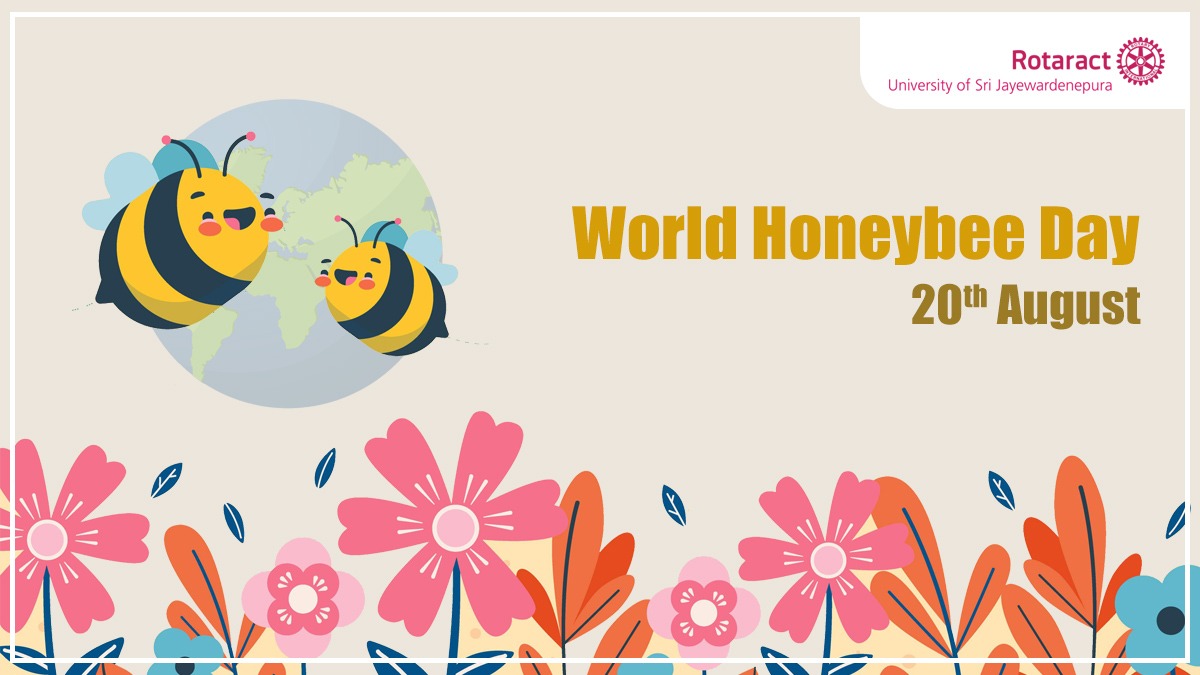Bees are disappearing at a fast rate, without them, who will pollinate?
World Honeybee Day is celebrated every third Saturday in August. It is a holiday that reminds us of the beauty and value of bees. Do you know there are 20,000 different species of bees around the world? The day especially emphasizes the importance of bees in our world and helps to raise awareness of the dangers honeybees have to face, with suggested ways of solving the problem.
The first World Honeybee Day was celebrated in 2009 and has since grown its popularity. The day is intended to promote beekeeping and exposes a lot about honeybees. Honey is used in some of the most delectable dishes found all around the world. Honey has a worldwide appeal and is frequently used as a metaphor for fruitfulness in literature.
Since the earliest civilizations, honey has been used as a sweetener for all sorts of food. Though the method of collecting honey was sometimes painful, the people still happily took the risk. The importance of honey was not limited to edibility alone. It has been used as a preservative and for treating certain ailments. The benefits of honey quickly sparked the desire for beekeeping in the Egyptian civilization. The method and upkeep improved as time went on. After a comb harvest, a man named Lorenzo Langstroth discovered a way to keep the hive going.
Bees do have a significant role in pollination. Because pollination is so crucial to us, this has drawn a lot of attention to the role of bees. World Honeybee Day is thus dedicated to raising awareness about the numerous advantages of bees. It’s a day to celebrate beekeeping and encourages us to learn more about it. However, it is also a day that reminds us of the worldwide extinction of bee species. It’s a holiday that encourages us to think about our impact on the environment.
The theme of World Honeybee 2022 is “Bee engaged: Celebrating the diversity of bees and beekeeping systems”.
By this theme, The United Nations focused on the importance of a wide variety of bees and threats of protection to bees, other pollinators, and beekeepers. The UN also urged upon bee-keeping systems awareness and the importance of bee-derived products. Further, it provides a direction for all the celebrations of World Bee Day around the world.
Of course, honeybees provide us with honey, and this is one of the many reasons why we should be thankful for them! Honey is a golden, thick liquid, which is produced by bees using the nectar of flowering plants. The kind of flowers that bees visit will impact the texture, smell, and taste of the honey, resulting in different types of honey, including orange blossom, clover, acacia, and manuka honey.
There are a lot of nutritional benefits that are associated with adding a bit of honey to our diet. High-quality honey offers several numbers of benefits because of the antioxidants that are included. These include phenolic compounds, such as flavonoids, as well as organic acids. The antioxidants that are found in honey have been linked to lowering the risk of strokes, heart attacks, and some forms of cancer. They are also believed to assist in terms of eye health.
Moreover, today honeybee enthusiasts, beekeeping associations and clubs, and beekeepers celebrate the honeybee. They recognize the contribution of honeybees in our lives, as well as learn about the different steps that we can take to protect this vital species. On World Honeybee Day, we also pay homage to beekeepers. After all, it is their efforts that make sure that there are healthy and well-managed bees to pollinate crops.
There have also been studies that have shown that honey can help to improve our cholesterol levels. If we have high LDL cholesterol levels, then we are going to be at a greater risk of having heart disease. This sort of cholesterol plays a massive role in atherosclerosis, which is the fatty buildup in our arteries that can cause strokes and heart attacks as well. There are more and more studies that are showing that honey can help to enhance our cholesterol levels. This is because it significantly raises the good HDL cholesterol while lowering the total of bad LDL cholesterol.
Bees are critical to our daily living, yet they are in decline on a worldwide scale. This is because they face several different threats. The use of toxic pesticides is one of these threats. They are also at risk due to habitat loss, as there has been an increase in invasive farming methods and urban developments, meaning that places that honeybees used to call home do not exist anymore.
In honour, of World Honeybee Day, we should raise awareness regarding the risks that honeybees all around the world face and the steps that we can take to help them. We can begin by researching this issue so that we can find more information about the different challenges that bees face and the reasons why their population is on the decline. By doing this, we will then be able to educate others and make sure that the number of bees starts to increase again, rather than decline.
Written by: Rtr. Imesha Udawatta
Graphic design by: Rtr. Supun Tharaka


0 Comments